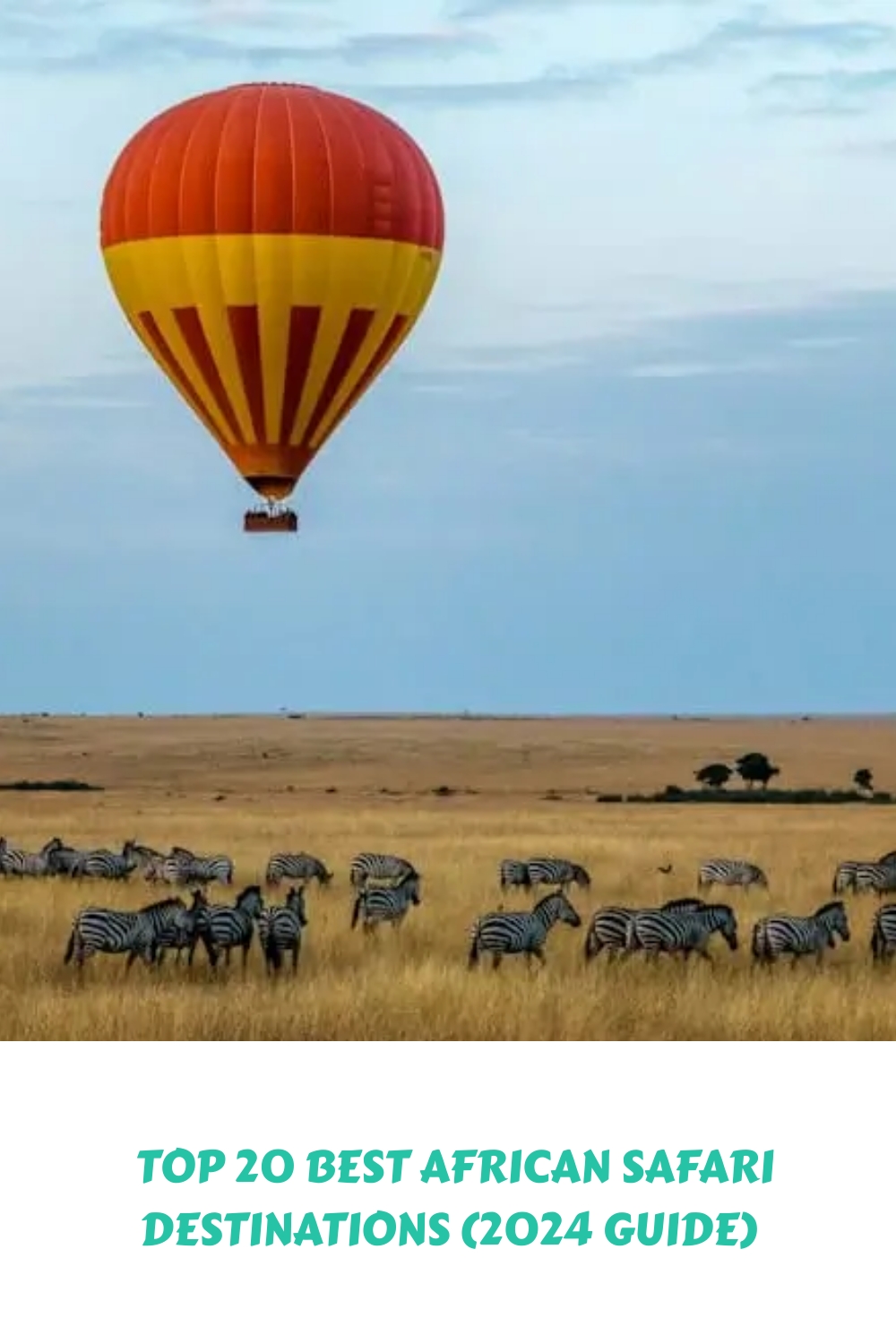🧭 What are the best African safari destinations?
The best African safari destinations can vary depending on what you want to see and experience.
For the classic savannah and the Big Five, Kenya’s Maasai Mara National Reserve and Tanzania’s Serengeti National Park are unbeatable.
For a unique water-based safari, Botswana’s Okavango Delta is exceptional.
If you’re interested in gorilla trekking, Uganda’s Bwindi Impenetrable National Park is the destination of choice.
In this article, we will go through the Top 20 African safari destinations and explore the majestic world of African safari destinations – a journey that transcends ordinary travel experiences – taking you into the heart of untamed wilderness.
Join us as we unveil the secrets of the best African safari destinations, a journey where every path leads to discovery, and every moment is a treasure!
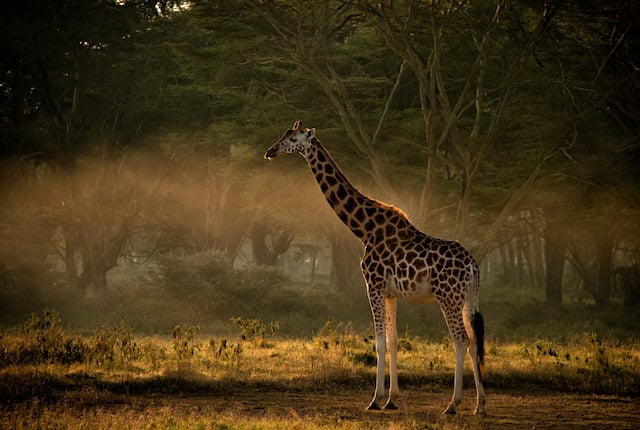
🏞️ Top 20 African Safari Destinations
🦁 1. Maasai Mara National Reserve, Kenya
The Maasai Mara National Reserve is a beacon for safari enthusiasts. This great place is synonymous with the Great Migration, a natural spectacle featuring millions of wildebeest and zebras.
Visit during the dry season for the best wildlife viewing, as animals congregate around the Mara River. For an exclusive experience, choose a lodge in a private concession where guided walking safaris can bring you closer to nature. The reserve is also home to an impressive array of bird species, offering a complete safari experience.
Aside from the migration, the Masai Mara is a stronghold for the big cats – lions, leopards, and cheetahs are often sighted in the golden grasslands. The reserve’s natural habitat also supports the majestic African elephants and the African bush elephant, making every game drive an adventure.
Experienced guides from local communities add to the enriching experience, blending wildlife viewing with cultural insights.
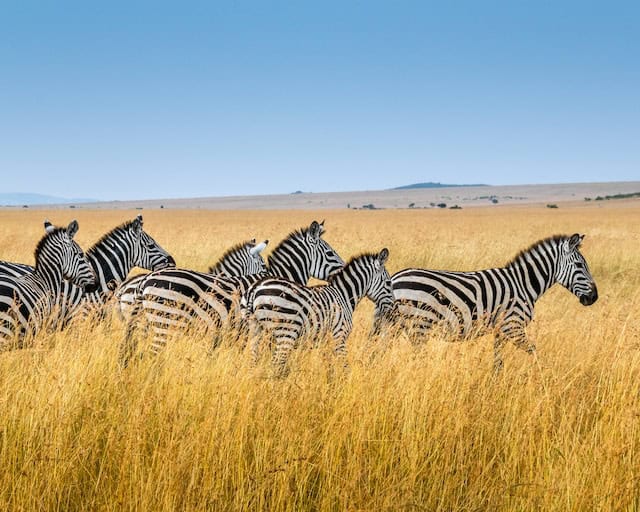
🐘 2. Serengeti National Park, Tanzania
Serengeti National Park in northern Tanzania is a vast ecosystem that’s home to some of the densest populations of large predators. Here, the acacia-dotted landscapes are the stage for nature’s dramatic shows.
The park is part of the Ngorongoro Conservation Area and the larger Serengeti ecosystem, recognized as a UNESCO World Heritage site. Its natural beauty is unparalleled, especially during the peak season of the wildebeest calving period, which offers a chance to see nature’s beginning of life.
The Serengeti is one of the best African safari destinations due to its incredible wildlife and expansive savannas. From the luxurious camps in the Sabi Sands Game Reserve to the rustic charm of the public campsites, there’s an accommodation option for every type of traveler. Night drives and balloon safaris provide alternative ways to witness the park’s splendor, while the Serengeti’s big cats, especially its lions and cheetahs, are the stars of the show.
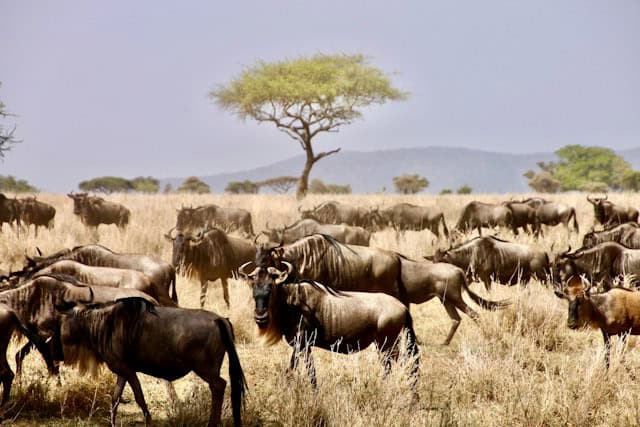
🛶 3. Okavango Delta, Botswana
Botswana’s Okavango Delta is a miracle of nature – a vast inland river delta where water flows into the sands of the Kalahari Desert creating a lush, wildlife-rich oasis.
Boat trips and mokoro rides offer serene encounters with the delta’s diverse inhabitants, from the African elephants that wade through the waters to the big cats that prowl the islands.
Private reserves here offer secluded luxury and a chance to engage in conservation areas that are actively involved in protecting the natural environment.
During the rainy season, the delta transforms, attracting a wide range of bird species and revitalizing the land.
The Okavango Delta is also one of the best African safari destinations where you get to encounter the rare and endangered African wild dog.
For those looking to delve deeper into the delta, walking safaris led by expert guides provide an immersive experience in one of the best African safari destinations.
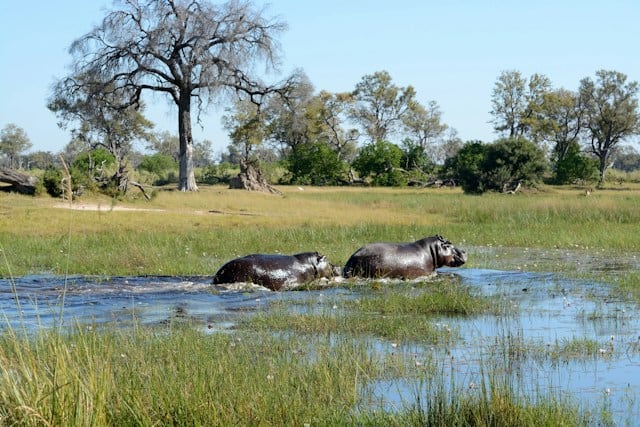
🌋 4. Ngorongoro Crater, Tanzania
The Ngorongoro Crater, often referred to as ‘Africa’s Garden of Eden‘, is a breathtaking natural habitat teeming with wildlife. As the world’s largest intact volcanic caldera, the crater floor is over 20 kilometers across and home to over 25,000 animals, offering perhaps the best opportunity in Africa to see the endangered black rhino. With bird species in the hundreds, it’s a paradise for birdwatchers and a UNESCO World Heritage site that’s crucial for biodiversity.
Above the crater’s rim, the highlands offer walking safaris that explore the Ngorongoro Conservation Area and its traditional Maasai communities.
The wildlife viewing experience here is unique; nowhere else can you so easily spot a variety of animals in such proximity. The best time to visit is the dry season when large animals frequent the crater’s watering holes, though the rainy season brings a special vibrancy to the landscape.
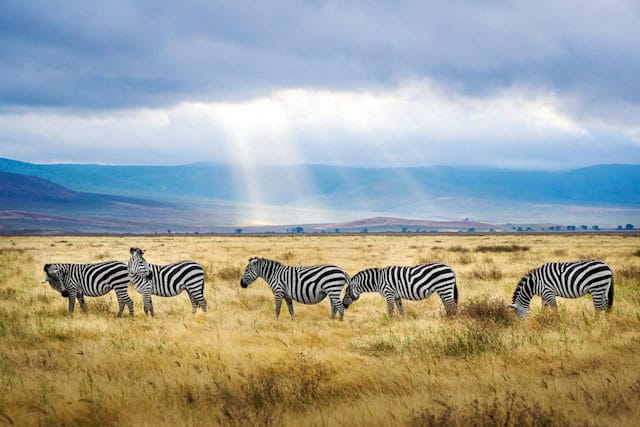
🦏 5. Kruger National Park, South Africa
Kruger National Park is the jewel of South Africa’s national parks and a must-visit for any safari aficionado.
Spanning nearly 2,000,000 hectares, the park’s vast landscapes provide a sanctuary for an impressive number of species, including the Big Five.
The dry season is particularly auspicious for wildlife enthusiasts, as animals gather around watering holes and rivers, making them easier to spot. Kruger National Park is not just about the animals; it’s a vital conservation area with a rich archaeological heritage, easily making it one of the best African safari destinations.
For travelers seeking an immersive experience, the park offers a variety of safari experiences, from self-drive adventures to guided tours in open safari vehicles.
Accommodations range from basic campsites to luxury lodges in private reserves like the exclusive Sabi Sands Game Reserve, which shares an unfenced border with Kruger National Park.
Here, you can indulge in night drives and walking safaris that offer a different perspective of the park’s incredible wildlife.
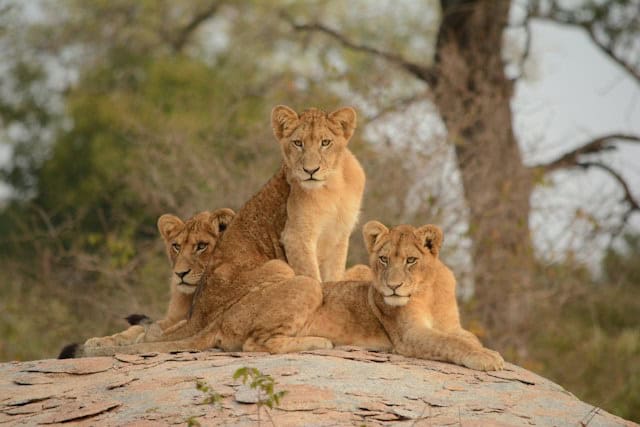
Recommended Reading: 🏕️ Safari Tents South Africa: From Glamping to Luxury Camps
🦒 6. Etosha National Park, Namibia
The vast Etosha National Park in Namibia is named after the large Etosha salt pan, a UNESCO World Heritage site.
During the dry season, the pan attracts animals from all over the park, especially at watering holes, creating some of the most intense wildlife encounters on the continent.
Etosha is known for its large area of open grassland and savanna, which provides a backdrop for some of the best African safari destinations. The park’s accessible wildlife viewing opportunities make it among the top African safari destinations.
Etosha’s natural environment is home to large animals such as elephants and the endemic black rhino. The park is also an excellent place for birdwatching, with over 340 bird species recorded.
For those seeking a unique experience, the Etosha Pan itself is a sight to behold, especially after a rain when it attracts a flurry of flamingos. Accommodations within the park range from comfortable rest camps to luxurious lodges on private concessions.
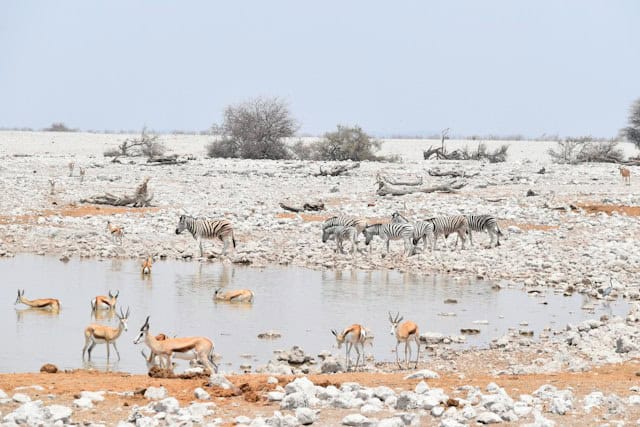
👑 7. Queen Elizabeth National Park, Uganda
Queen Elizabeth National Park in Uganda offers a unique safari experience, with its open savannas, dense papyrus swamps, and crater lakes.
It is a prime location for viewing a variety of mammal species, including tree-climbing lions that are a rare sight elsewhere.
The park’s Kazinga Channel is famous for its boat trips, which offer up-close encounters with hippos, crocodiles, and a variety of bird species. The best time to visit is during the dry season when wildlife is more visible.
The park is not only about game drives; walking safaris in the Maramagambo Forest reveal chimpanzees and other primates, while the Kyambura Gorge is known for habituated chimpanzee trekking experiences.
Queen Elizabeth National Park’s diverse ecosystems make it one of the best African safari destinations, with its wildlife viewing complemented by stunning volcanic features, including volcanic cones and deep craters.
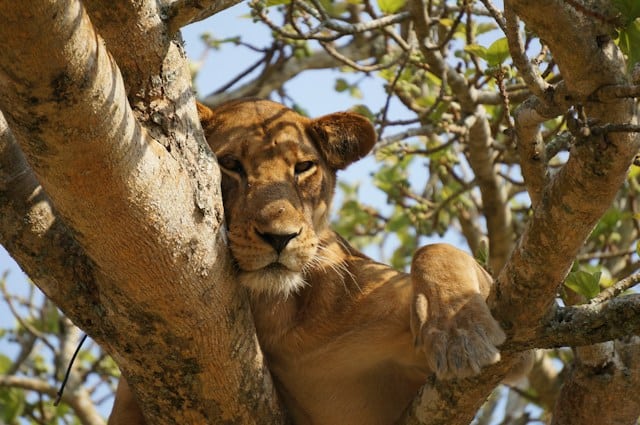
🌄 8. Hwange National Park, Zimbabwe
Hwange National Park is Zimbabwe’s largest game reserve and one of the least crowded African safari destinations.
Known for its large animal populations, especially elephants, Hwange offers visitors the chance to experience Africa as it once was.
The park’s dry season sees the wildlife congregating in vast numbers around the watering holes, providing extraordinary game viewing opportunities. Night drives are particularly rewarding, with chances to see predators like lions and hyenas in action.
Hwange’s commitment to conservation is evident in its efforts to protect endangered species like the African wild dog and the black rhino.
The park’s natural habitat is a mix of desert sand to sparse woodland as well as grasslands and granite outcrops, hosting over 100 mammal species and close to 400 bird species.
To experience the park’s full majesty, consider staying at one of the private reserves or lodges that offer guided walking safaris and a deeper understanding of this incredible wildlife sanctuary.
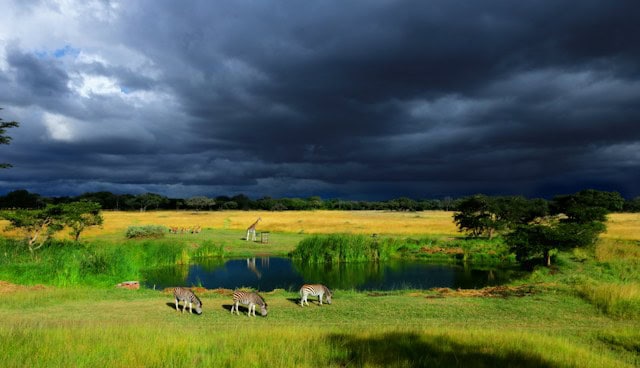
🌳 9. South Luangwa National Park, Zambia
South Luangwa National Park is a haven of wildlife viewing in Zambia, offering one of the most intense African safari destinations where you get to experience the wilderness of Africa.
It’s renowned for pioneering walking safaris, which provide an authentic way to experience the African bush. The park’s diverse landscapes range from dense forests of mopane trees to wide-open savannas. It’s a place where you can witness a high density of big cats, especially leopards, which are often seen during the park’s famous night game drives.
The Luangwa River, flowing through the park, is a lifeline for the park’s wildlife and a great spot for observing crocodiles and hippos.
The dry season in South Luangwa transforms the landscape into a parched expanse, drawing animals out into the open and providing exceptional photographic opportunities.
For those seeking a private reserves experience, the park offers several secluded camps where you can enjoy the serenity of nature without the crowds.
South Luangwa is also known for its responsible tourism practices and involvement in community development, ensuring that your visit contributes to the sustainability of this natural habitat.
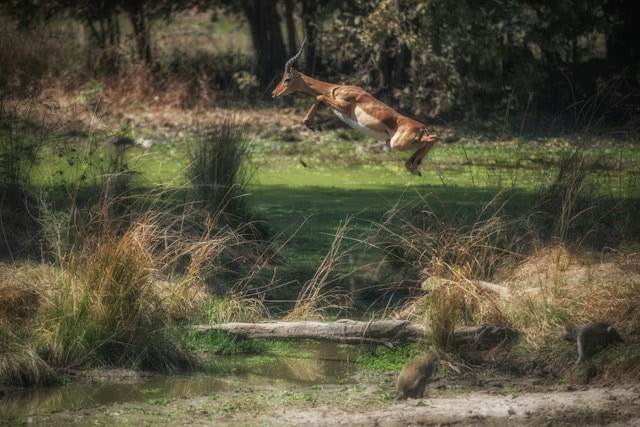
🐆 10. Nyerere National Park (formerly Selous Game Reserve), Tanzania
Previously known as Selous Game Reserve, Nyerere National Park is one of Africa’s largest protected areas and a UNESCO World Heritage site. It’s a wild and pristine landscape, filled with mammal species like elephants, wild dogs, and buffalos.
The park is bisected by the Rufiji River, offering spectacular boat trips where visitors can see wildlife from a different perspective. Walking safaris and fly-camping are among the immersive experiences available in Nyerere, allowing for an up-close and personal encounter with nature.
The park’s vast wilderness remains one of the best African safari destinations for those looking to escape the more frequented safari routes. It’s a top safari destination not just for its wildlife, but for its efforts in conservation and the protection of its natural environment.
The best time to visit is during the dry season when animals are easier to spot, but even in the rainy season, Nyerere offers a safari experience like no other, with lush scenery and fewer visitors.
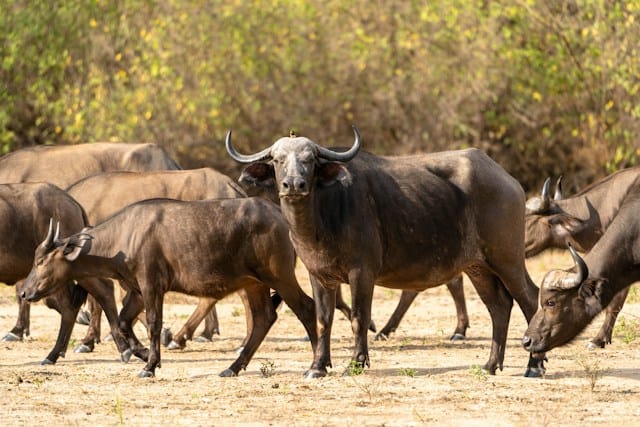
🌲 11. Madikwe Game Reserve, South Africa
Madikwe Game Reserve is a hidden gem located in the North West province of South Africa. As one of the lesser-known reserves, it offers a secluded and uncrowded safari experience. It’s a malaria-free zone, making it a popular choice for families.
Recommended reading: 👨👩👧👦 Family Safari in Kenya | Best Tours and Packages
Known for its wild dogs, Madikwe offers excellent opportunities for sightings of these rare predators.
The reserve’s natural habitat is incredibly diverse, ranging from open plains to dense bushveld, providing a home to a wide variety of mammal species and bird species.
The lodges within Madikwe are known for their luxury and comfort, with many offering stunning views of the reserve’s watering holes and wildlife viewing areas.
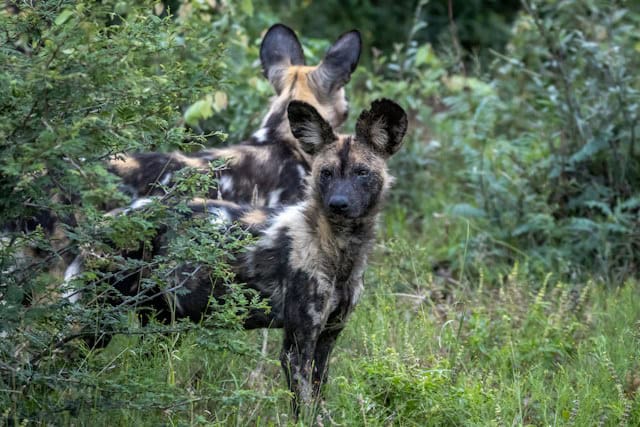
🏞️ 12. Amboseli National Park, Kenya
Amboseli National Park is renowned for its stunning views of Mount Kilimanjaro and its large herds of African elephants. The park is one of the best African safari destinations to get close to elephants in their natural habitat, and the marshlands provide a lush contrast to the otherwise dry and dusty landscape. Bird species abound here, making it a paradise for birdwatchers.
Amboseli’s safari experience is characterized by the vast open skies and horizons, with the impressive backdrop of Africa’s highest peak.
The park’s dry season is an ideal time to visit, as the wildlife congregates around the remaining water sources, but Amboseli is rewarding year-round with its consistent wildlife viewing opportunities. With its proximity to Nairobi, Amboseli is a great place for those looking to combine a city trip with a safari experience.
Whether you choose a luxury lodge or a rustic camp, Amboseli offers an unforgettable African safari full of natural beauty and wild animals.
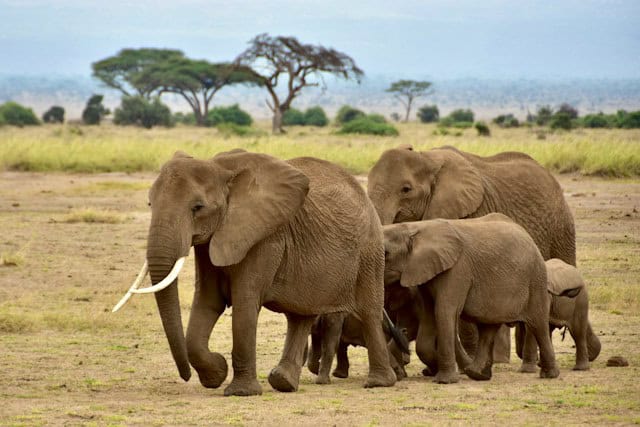
🦓 13. Chobe National Park, Botswana
Chobe National Park, located in Botswana, is most famous for its colossal elephant population, the largest in Africa. The park’s elephants are especially visible during the dry season along the Chobe River, which serves as a watering hole for various wildlife.
Chobe’s safari experience is unique in that it offers both land and water-based activities, including memorable boat trips that provide a different vantage point for wildlife photography.
Chobe’s Savuti region is renowned for its predator sightings, where lion pride and hyenas compete over territory and prey.
The park’s bird species diversity is impressive, especially during the rainy season when migratory birds are present.
Private concessions along the riverfront offer secluded luxury, while the public camping sites allow for an immersive, self-sufficient adventure in the wild.
Chobe’s commitment to conservation makes it a model for sustainable tourism in southern Africa.
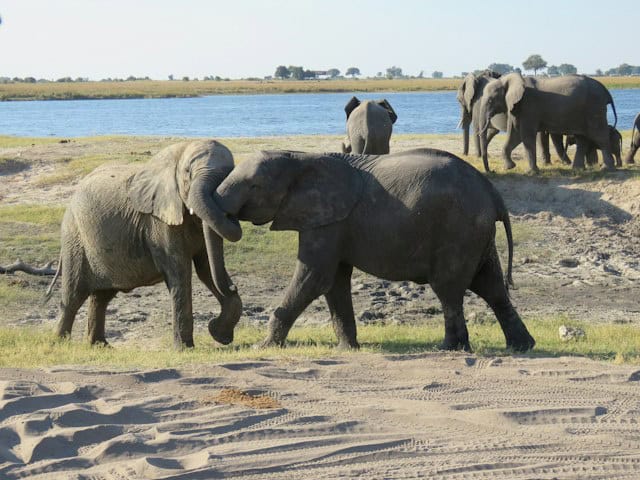
🌾 14. Moremi Game Reserve, Botswana
Moremi Game Reserve is a richly diverse wildlife sanctuary nestled in the heart of the Okavango Delta. It offers a unique mix of lagoons, flooded pans, vast grasslands, and dense forests. This game reserve is a prime location for spotting the elusive big cats and is known for some of the best wild dog sightings in Africa.
The dry season is perfect for game viewing as animals are drawn to permanent water sources, while the rainy season transforms the landscape into a lush animal nursery.
Moremi is not just an animal haven; it’s a birdwatcher’s paradise with hundreds of bird species flourishing in its ecosystems. Visitors can explore the reserve on traditional mokoro canoes, a tranquil way to experience the delta’s beauty.
For those seeking thrilling African safari destinations, night drives offer a chance to witness the nocturnal wildlife.
Staying within the reserve’s private concessions allows for an intimate wilderness experience and contributes to the conservation of this UNESCO World Heritage site.
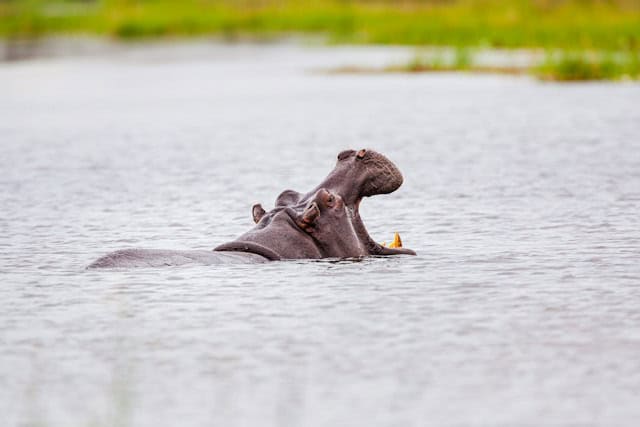
🐊 15. Lower Zambezi National Park, Zambia
Lower Zambezi National Park is Zambia’s untamed gem, offering an exceptional riverine safari experience. The mighty Zambezi River forms the park’s natural boundary and is a magnet for wildlife, including large herds of elephants and various mammal species.
The park’s natural beauty is striking, with a backdrop of the Zambezi Escarpment. Canoeing safaris are a standout here, allowing silent up-close encounters with hippos and crocodiles, while the park’s private reserves offer exclusive game viewing without the crowds.
The dry season is the optimal time for wildlife sightings, as animals gather at the river and in the floodplains.
Night game drives are a thrilling way to explore the park, with opportunities to spot nocturnal creatures and predators on the hunt.
The park is also a great place for fishing enthusiasts, offering some of the best tiger fishing in Africa.
Walking safaris led by experienced guides offer a ground-level view of this natural habitat and a more adventurous take than most African safari destinations.
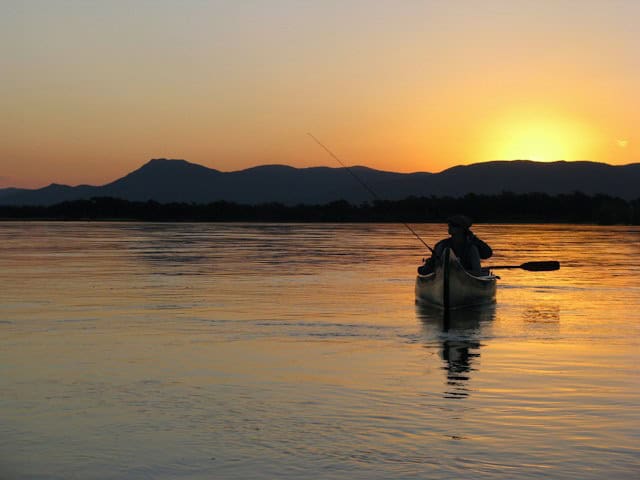
🌵 16. Ruaha National Park, Tanzania
Ruaha National Park, located in central Tanzania, is a rugged wilderness teeming with wildlife. Known for its large populations of elephants, lions, and rare African wild dogs, Ruaha offers a safari experience that is both raw and captivating.
The park’s vast square kilometers encompass a diverse landscape of baobab trees, rocky outcrops, and sandy rivers. It’s one of the best places for those seeking solitude and an escape from the tourist trail.
Recommended reading: 🌳 17 Most Iconic Trees to See On Your African Safari
The dry season brings the park to life, as animals congregate around the Great Ruaha River and other watering holes, providing exceptional game viewing opportunities.
Bird species are plentiful, with over 570 species of birds recorded, making Ruaha a birding paradise.
The park’s walking safaris are an unmissable adventure, offering intimate wildlife encounters and insights into the African bush from experienced guides.
With its remote location, Ruaha remains an untouched natural habitat, offering a genuine wilderness experience.
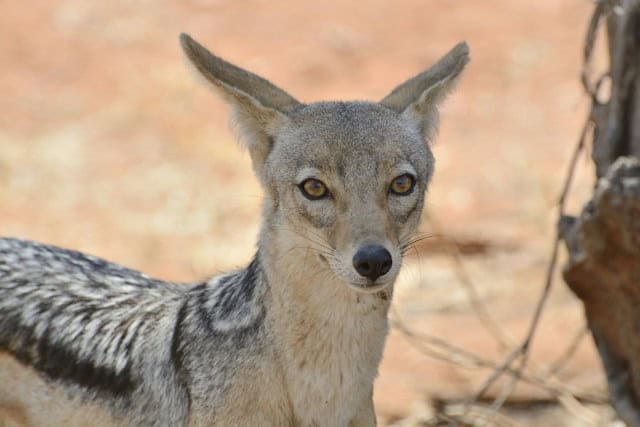
🦌 17. Samburu National Reserve, Kenya
In the arid North of Kenya, Samburu National Reserve offers a distinctly different safari experience. Its rugged landscape is home to unique wildlife adapted to the semi-desert environment, including species not found in the southern parks, like the reticulated giraffe, Grevy’s zebra, and Beisa oryx.
The Ewaso Ng’iro River is the lifeblood of the reserve and attracts a wealth of wildlife, providing excellent game viewing opportunities.
The reserve’s natural beauty is characterized by thorny scrubland, acacia trees, and red dirt, offering a striking contrast to the lush savannahs of southern Kenya.
Samburu is also a rich cultural hub, where visitors can learn about the Samburu people’s rich heritage and traditional way of life.
The dry season is the best time for game viewing, although the rainy season brings a refreshing green flush to the landscape and an abundance of newborn animals.

🚣 18. Mana Pools National Park, Zimbabwe
Mana Pools National Park, set along the lower Zambezi River in Zimbabwe, is renowned for its natural splendor and for offering one of Africa’s most remarkable wildlife viewing experiences.
The park’s name, “Mana,” means ‘four’ in the local Shona language, referring to the four large pools formed by the meandering Zambezi. These watering holes are a haven for large concentrations of hippos, crocodiles, and a rich variety of aquatic bird species.
During the dry season, the concentration of animals around the water sources is spectacular, with elephants, buffalos, and a wide range of predators being regular sights.
Mana Pools is also one of the few African safari destinations where self-guided walking safaris are allowed, offering adventurous visitors the chance to experience the African wilderness on foot.
The park’s status as a UNESCO World Heritage site underscores its importance as a conservation area and its untouched natural habitat.
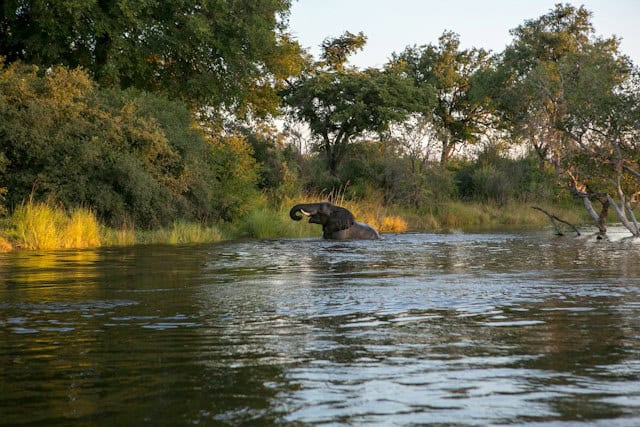
🌲 19. Bwindi Impenetrable National Park, Uganda
Bwindi Impenetrable National Park is a haven of biodiversity located in the mountainous southwest of Uganda. It is one of the best African safari destinations in the world to see mountain gorillas in their natural habitat.
Trekking through the park’s dense, misty forests offers a once-in-a-lifetime opportunity to encounter these gentle giants up close. With half of the world’s remaining mountain gorilla population residing in Bwindi, the park plays a crucial role in their conservation.
The park is not just about gorillas; it’s also a UNESCO World Heritage site with over 120 mammal species, including several primate species, and more than 350 bird species.
Bwindi’s rugged terrain offers challenging hikes and the chance to discover its natural beauty with each step.
While gorilla trekking is the main draw, the park also provides insight into the local Batwa pygmy culture, adding a cultural dimension to the safari experience.
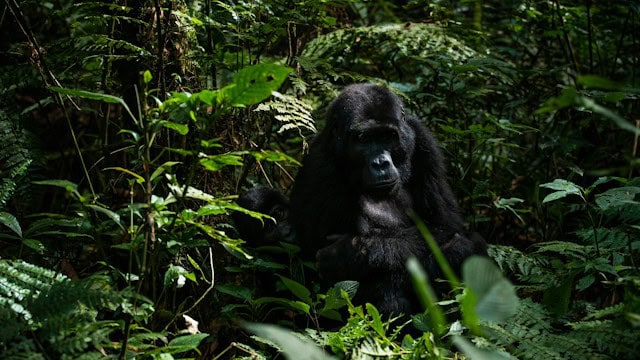
🐾 20. Ol Pejeta Conservancy, Kenya
Ol Pejeta Conservancy is a leader in conservation and sustainable development in East Africa. It’s the largest sanctuary for black rhinos in East Africa and is the only place in Kenya to see chimpanzees.
The Conservancy offers an array of safari experiences, including night game drives that provide encounters with nocturnal creatures. Its private reserves status ensures a highly personal and exclusive experience.
The varied terrains and watering holes within Ol Pejeta create a rich natural habitat for a diverse array of wildlife, including the Big Five.
Bird species enthusiasts will also find the conservancy rewarding, with numerous species flitting through the acacia trees.
Ol Pejeta is one of the many African safari destinations where visitors can engage with the cutting-edge conservation techniques employed here and learn about the critical work being done to protect endangered species.
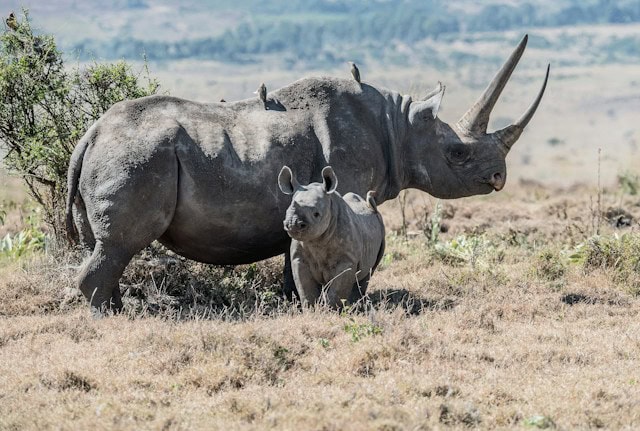
📚 Practical Guide to African Safari Destinations
Planning an African safari can be an exhilarating yet complex task. Here are some key considerations to ensure a memorable and hassle-free experience:
🗺️ Choosing the Destination
- East Africa vs. South Africa
- East Africa (Kenya, Tanzania, Rwanda, Uganda) is ideal for a classic “National Geographic” experience with abundant wildlife and phenomena like the Great Wildebeest Migration.
- South Africa offers a well-rounded experience, combining wildlife viewing with cultural and historical explorations like Cape Town and the Winelands.
- Focus on Fewer Countries: For a first-time safari, it’s advisable to focus on one or two countries to avoid feeling rushed and to be fully immersed in African safari destinations.
⏳ Timing Your Safari
- Best Time to Visit: The timing of your trip can greatly influence wildlife sightings.
- The wildebeest migration in East Africa, for example, is a year-round event but varies in location by season. The crossing at Mara River usually happens between July and October, which is considered to be the best time to visit the Maasai Mara.
- For Southern Africa, consider the dry months (May to October) for better wildlife viewing as animals congregate around water sources.
- Trip Length: A minimum of 8 days, excluding travel time, is suggested to experience African safari destinations and wildlife adequately.
🐾 Safari Type
- Scheduled vs. Private Safaris
- Scheduled group safaris are budget-friendly and allow interaction with other travelers.
- Private safaris offer more flexibility and customization, ideal for luxury lodges or large groups. In Southern Africa, safari game drives are typically provided by the camp or lodge you’re staying at.
- Activities and Experiences: Beyond game drives, consider unique activities like hot air balloon safaris, cultural visits, trekking, and water-based adventures like canoeing in the Okavango Delta.
🏠 Accommodation and Budget
- Accommodation Type: Choices range from budget-friendly lodges to luxury tented camps. The accommodation type will influence your budget and activities.
- Budget Planning: An 8-day safari can range significantly in cost, from $2,000 to over $20,000 per person. Establishing a budget upfront can guide the selection of accommodations, transportation, and activities.
🤝 Safari Etiquette and Safety
- Wildlife Viewing: Take your time to observe and enjoy wildlife, but avoid spending excessive time at one spot, allowing others to experience the sighting.
- Photography: Capture the moments but be mindful of storage space; carrying extra memory cards is advisable.
- Safety and Rules: Follow the guidelines provided by guides and park authorities. Stay inside the safari vehicle, and be attentive during walking safaris.
- Health Precautions: Stay hydrated, use sunscreen, and carry a first aid kit for emergencies. Consider anti-malarial precautions and carry insect repellent.
👕 What to Wear and Pack
- Clothing: Opt for neutral-colored clothing. Bright colors may attract wildlife and are not recommended, especially during walking safaris.
- Essentials: Pack sunscreen, a hat, sunglasses, chapstick, a water bottle, and bug spray. A daypack is useful for carrying these essentials during game drives.
Remember, each safari is unique, and personal preferences play a significant role in planning. Tailoring your trip to your interests, from wildlife focus to cultural experiences, will enhance your overall experience.
Recommended reading: 🧳 Your Tanzania Safari Packing List: Tips and Advice
🌱 Responsible Safari Tourism
Going on an African safari is not just about the excitement of seeing majestic animals in their natural habitat; it’s also about understanding and engaging responsibly with the environment and local communities.
Here are some key points to consider for responsible safari tourism:
👀 Ethical Wildlife Viewing
- Respect for Animals: Maintain a safe and respectful distance from wildlife. Avoid behaviors that could stress or threaten animals, such as loud noises or rapid movements.
- No Feeding: Never feed wild animals, as this can alter their natural behaviors and diet.
- Minimize Impact: Stick to established safari routes to reduce environmental impact and avoid disturbing wildlife.
🤲 Cultural Sensitivity
- Engaging with Local Communities: When visiting local villages or engaging with indigenous communities, show respect for their traditions and customs. Ask for permission before taking photographs.
- Support Local Economy: Where possible, support local businesses and craftspeople by purchasing locally made souvenirs and products.
🌿 Environmental Conservation
- Litter-Free Safaris: Always dispose of trash properly. Avoid plastic usage, and if you must use it, ensure it leaves with you.
- Conserve Resources: Be mindful of water and electricity usage, especially in areas where these resources are scarce.
- Support Conservation Efforts: Engage with lodges or tour operators who actively support wildlife conservation and community development projects.
🏕️ Safari Camps and Lodges
- Eco-Friendly Practices: Choose accommodations that practice sustainability, such as using solar power, water conservation methods, and employing locals.
- Conservation Programs: Some safari camps and lodges run or support wildlife conservation programs. Staying at these places or participating in their programs can contribute to conservation efforts.
📅 After Your Safari
- Sharing Experiences: Share your experiences in a way that promotes conservation and respect for wildlife and cultures. Use your stories and photos to raise awareness about the importance of preserving these incredible places and creatures.
By being a responsible tourist, you not only ensure a more enriching and authentic experience for yourself but also contribute to the sustainability and preservation of Africa’s unique wildlife and cultural heritage. Remember, your actions can have a lasting impact on these African safari destinations, so choose to travel responsibly.
🤔 Conclusion and Reflections on African Safari Destinations
An African safari is more than just a vacation; it’s a transformative journey that leaves an indelible mark on your heart and mind. As we wrap up this exploration of African safari destinations, let’s reflect on the profound impact such an adventure can have.
💭 Personal Transformation
- Safaris often test and reveal your inner strength and resilience, especially in challenging environments like summiting Mount Kilimanjaro. The simplicity of focusing on the next step in such arduous conditions can lead to profound personal insights and a deeper connection with oneself.
- Such experiences tend to bring forth a profound realization that peace and serenity might be closer than we think – often lying within us, waiting to be discovered when we strip away our external identities and distractions.
🌍 Cultural Enrichment
- Engaging with local communities and experiencing the cultural richness of Africa can shift perspectives. The joy of experiencing life with a fresh, childlike wonder is often rekindled, bringing a new appreciation for the simple yet beautiful moments in life.
🦓 The Safari Experience
- The essence of a safari lies in the unexpected and spontaneous moments – the sight of a lion, the majesty of a baobab tree, or the awe of a vast landscape. It’s about embracing each moment as it comes, without clinging to it.
🌱 Environmental and Wildlife Appreciation
- Witnessing wildlife in their natural habitat highlights the importance of conservation efforts and fosters a deeper appreciation for biodiversity. It often leaves travelers with a heightened sense of responsibility towards preserving these natural wonders once you see them up close and personal.
🔍 The Joy of Discovery
- Activities like visiting a spice farm or engaging in unique culinary experiences add layers of enjoyment to the safari experience, offering new tastes and smells that become part of the mosaic of memories you will cherish for a lifetime.
🌟 Lingering Impact
- Returning from a safari often brings a new perspective on life. The realization that happiness and peace are intrinsic qualities can be a powerful insight, influencing how life is approached thereafter.
As we close, I’d like you to think of an African safari as an adventure that goes beyond wildlife viewing. It’s an opportunity for self-discovery, cultural immersion, environmental appreciation, and personal growth.
The experiences and insights gained from such a journey resonate long after returning home, often leading to a deeper understanding of oneself and the world around us.
This adventure is not just about what you see but about what you feel, learn, and become in the process!
“Not all those who wander are lost.”
J.R.R. Tolkien
❓ Frequently Asked Questions (FAQs) about African Safari Destinations
🌍 Which country in Africa is best for safari?
Each country offers something different.
Kenya and Tanzania are renowned for their vast savannahs and large animal herds, especially during the Great Migration.
Botswana is praised for its conservation efforts and luxury safari experiences.
South Africa offers diverse safari experiences that can include the savannah, desert, and beach, as well as being family-friendly and suitable for first-time safari-goers due to its developed infrastructure.
💸 Which African safari is the cheapest?
The cost of a safari can vary widely, but generally, South Africa, Kenya, and Tanzania offer a range of options that can accommodate tighter budgets.
South Africa’s Kruger National Park has some of the most affordable safari lodges and camps, and many self-drive options can help reduce costs.
🤷 Is Kenya or Tanzania better for safari?
Both countries offer extraordinary safari experiences. Kenya is often favored for its beautiful landscapes, Maasai culture, and more accessible wildlife areas.
Tanzania offers a more extensive wilderness experience and is home to the Serengeti’s Great Migration.
Your choice may depend on the time of year and the kind of safari experience you seek.
🕒 When is the best time to go on safari?
The best time for a safari is typically during the dry season, which is from June to October for most of East and Southern Africa. This is when animals congregate around water sources, making them easier to spot.
However, the wet season can also offer unique experiences, such as bird watching and seeing newborn animals.
🎒 What should I bring with me on safari?
Essentials for a safari include:
- Lightweight, neutral-colored clothing
- A broad-brimmed hat
- High-SPF sunscreen
- A high-quality camera with spare batteries and memory cards
- Binoculars
- Insect repellent, and
- A good pair of binoculars.
It’s also advisable to bring a daypack for carrying these items during game drives.
👨🏫 Do I need a guide on a safari?
While some national parks allow self-drive safaris, it is generally advisable to have a guide, especially in remote and vast parks where navigation and spotting wildlife can be challenging.
Guides are experts in tracking animals and can provide invaluable insight into the behavior and ecology of the wildlife you’ll be observing.
Tell us about your experience on an African safari, we would love to hear about it in the comments section. Check out our other articles to learn more about African safaris!
